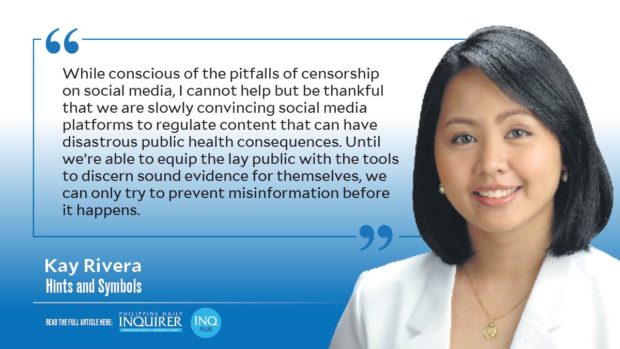Continuing fight against medical misinformation
This week, YouTube took the step of banning anti-vaccine content on its platform. The outcry against Facebook and YouTube being cesspools of medical misinformation has existed for years; with the stakes increasingly high due to COVID-19, the pressure has increased for these two major platforms to supervise uploaded content. Ethically it has been a question of protection of freedom of speech versus allowing the clear consequences of large-scale medical misinformation. With social media giants facing criticism for allowing misinformation to run rampant, Facebook and YouTube had previously banned overt COVID-19 misinformation on their platforms. YouTube has only recently extended this ban to misinformation on other vaccines already in use.
This prompts me to think of recent experiences with medical misinformation. Misinformed comments on the internet are a given, but sometimes, when I bother to read them, they can be instructive. In last week’s column, in response to a passing mention of ivermectin for COVID-19 treatment, a commenter accused me and other “anti-ivermectin” or “pro-vaccination” doctors of being scared to engage in debate with ivermectin supporters because we supposedly don’t have scientific data to back up our “allegations.” “Instead,” the comment continued, “you’re just spreading disinformation […] like suggesting ivermectin are just for horses and animals — what an ignorance!”
It is healthy to occasionally pay attention to such comments to prompt the search for sound evidence. What if, indeed, I was just being carried away by the media scrutiny on ivermectin and overlooked its potential? A little startled by the commenter’s certainty, I went through the usual steps of looking for evidence. A search through pubmed.gov, a search engine for a vast archive of scientific articles, as well as through other databases for reviews and clinical trials, led me to an update of my original views: That at present, the quality of evidence for ivermectin for the treatment or prevention of COVID-19 is not high. No one with a scientific mind would completely exclude the possibility of ivermectin or its components being a lifesaving treatment for COVID-19 in the future, but it is the interest of physicians to look out for patient safety first — to do no harm — and as such, many medical bodies do not feel that enough evidence exists to support ivermectin in the absence of further, better trials. The World Health Organization also does not exclude the possibility of ivermectin being a cure, but given this quality of evidence, can only caution that ivermectin use be limited to settings of clinical trials.
This is not a monograph on ivermectin, but rather a reflection on the use of appropriate tools to arrive at a scientific conclusion, and how lamentable it is that we cannot so easily equip others to use them. It can be difficult for those outside the sciences to appreciate the levels of evidence that go into medical recommendations.
I could instruct the lay person to go on the pubmed.gov database, to search “ivermectin” and “COVID-19,” and modify the settings to show the “most recent” search results. But in so doing I could not trust that, instead of looking at the prospective studies or meta-analyses — considered “high” level evidence because these gather data from different trials and appraise the quality of the evidence — the lay reader would not latch on to lesser quality papers and herald them as ammunition in the ivermectin debate. They could latch on to a paper on the activity of ivermectin against the virus in vitro, without realizing that “in vitro” does not translate to real-life safety and efficacy. They could latch on to a small trial on the use of the drug as prophylaxis for COVID-19 in health workers, without recognizing that the trial has an unacceptably small sample size and lacks randomization, rendering it non-generalizable to the general population.
To be able to change the firm convictions of the user who commented so passionately on my article, I would need to sit them down and work through the evidence with them, pointing out what qualifies as strong and what doesn’t. This is a daunting task to face in educating our friends and loved ones, to say nothing of faceless strangers on the internet. I am fortunate to be equipped with the tools to look for evidence, or the resources to ask those more qualified, but it is frustrating to be unable to communicate these thoughts effectively to those who have already been reached by (sometimes painfully convincing) misinformed content on YouTube, Facebook, Twitter, or Viber. While conscious of the pitfalls of censorship on social media, I cannot help but be thankful that we are slowly convincing social media platforms to regulate content that can have disastrous public health consequences. Until we’re able to equip the lay public with the tools to discern sound evidence for themselves, we can only try to prevent misinformation before it happens.
kchuarivera@gmail.com
For more news about the novel coronavirus click here.
What you need to know about Coronavirus.
For more information on COVID-19, call the DOH Hotline: (02) 86517800 local 1149/1150.
The Inquirer Foundation supports our healthcare frontliners and is still accepting cash donations to be deposited at Banco de Oro (BDO) current account #007960018860 or donate through PayMaya using this link.





















